News & Commentary
Getting It Dead Wrong for 30 Years
By Cassandra Stubbs,
Director, ACLU Capital Punishment Project
This post originally appeared on ACLU's National Blog of Rights.
According to Supreme Court Justice Antonin Scalia, Henry Lee McCollum deserved to die for the brutal rape and murder of 11-year-old Sabrina Buie. There's just one problem, and a frequent one in death penalty cases: Henry Lee McCollum didn't do it.
Instead of tracking down the true killer, police and prosecutors went after Henry Lee McCollum and his half-brother Leon Brown, two intellectually disabled and innocent teenagers.
By Guest Blog- ACLU National

Ferguson is Everytown, U.S.A.
By Nusrat Choudhury,
Staff Attorney, ACLU Racial Justice Program
This post originally appeared on ACLU National's Blog of Rights
The tragic killing of college-bound teenager Michael Brown has raised questions about the frequency with which police kill unarmed black men in America. The answer, unfortunately, is far too often.
Just three months ago, on a warm April afternoon, a white police officer shot and killed Dontre Hamilton, a 31-year-old black man, in downtown Milwaukee's Red Arrow Park. According to the Milwaukee police chief, the officer was "defending himself in a violent situation." But the eyewitness report of a Starbucks barista paints a very different picture.
According to the barista, Hamilton had been sleeping on the concrete sidewalk next to Starbucks when two police officers approached him, asked him questions, and left after determining that he was doing nothing wrong. But an hour or so later, she heard yelling. Looking out the Starbucks window, she saw a different white police officer standing up against Hamilton, "who was holding the officer's own baton in a defense posture." The officer "lunged" at Hamilton in an attempt to get the baton, but failed.
By Guest Blog- ACLU National
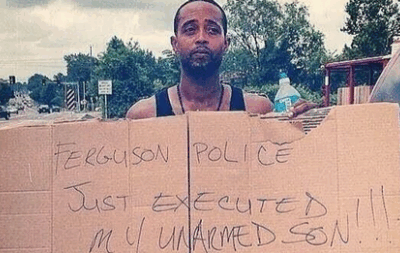
Florida Prosecutor Goes on a Killing Spree
By Tanya Greene,
Advocacy and Policy Counsel, ACLU National
Angela Corey is certainly making a name for herself. Not only has she worked to send more people to death row than any other state’s attorney in the Sunshine State, but she leads the pack nationally as well.
We’re all used to hearing stories about the madness that passes for criminal justice in Florida. Headlines like “Florida Man Wanted for Peeing on Gators Fans” are so funny they have their own dedicated Twitter feed. Much less hilariously,Marissa Alexander, a Black domestic violence survivor, was sentenced to 20 years for shooting a gun to scare off her abusive husband, hurting no one. (Corey—of George Zimmerman and Michael Dunn fame, it should be known—was also responsible for prosecuting Alexander, and is now seeking a 60-year sentence in the new trial.)
By Guest Blog- ACLU National
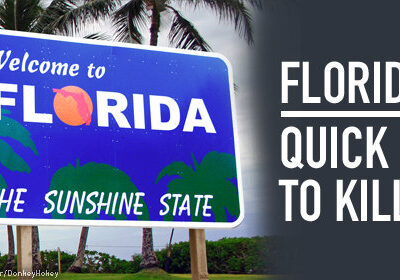
Let People Vote: Demonstration at A.G. Bondi's Office
Florida holds the dubious distinction of being among the three worst states to permanently disenfranchise individuals with a felony conviction. These individuals have limited possibility for restoration of civil rights unless they receive discretionary executive clemency. On the near eve of Dr. Martin Luther King Jr.’s birthday celebration, we are poignantly reminded that racism still exists in American society, that there are too many national policies that are inherently racist, and that right here in Florida, we have more than our share of discriminatory policies and practices.
Today, over 80 individuals including clergy and leaders from across the state, came together to call on Attorney General Pam Bondi to “Let My People Vote”. The speakers called for the automatic restoration of civil rights, to expedite the rights restoration application process, and to give back the right to vote for the over 1.5 million Floridians who have been disenfranchised by this system.
By Joyce Hamilton Henry
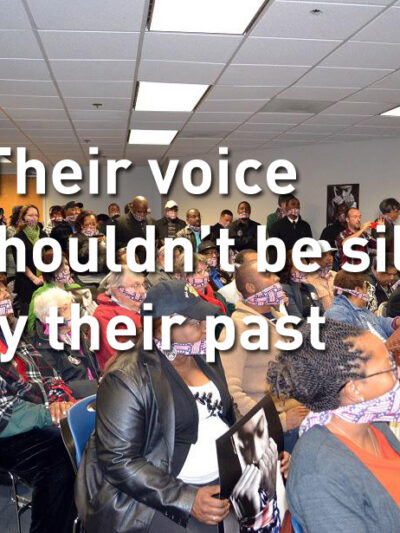
Time Out Is for Kids. This Isn't.
By Amy Fettig, ACLU National Prison Project & Tanya Greene, Advocacy and Policy Counsel
"I developed techniques to survive. I've learned to play chess with other [kids] through a six-inch wall to keep myself occupied. But for others, it breaks them, makes them either violent or suicidal."
These are the words of Lino Silva, who had been incarcerated in a juvenile facility for over seven years when she wrote them. The "it" she mentions is solitary confinement, a practice that juvenile facilities routinely use on the approximately 70,000 kids in this country who are in their care on any given day.
By Guest Blog- ACLU National

"I’ll Never See My Son's Prom Picture"
Alan Berger
Legislative Assistant, ACLU National
Lucille MacBeth, mother of slain Florida teen Jordan Russell Davis, did all she could to keep from crying during her testimony in front of the Senate Judiciary Subcommittee on the Constitution earlier this week. After nearly five minutes of testimony, Lucille stopped speaking, looked down and then back up, this time with tears in her eyes: "I'll never get to see my son's prom photo. I never get to hear how much he enjoys his dad's chili. No one else will ever get to know him. He'll never get to join the Marines like he dreamed and all because of guns and the power of these laws. These laws embolden people with hate to take action with that hate."
The hearing was to discuss the growth of violence and injustice associated with the "stand your ground" laws on the books in 25 states. Lucille's testimony, along with that of Trayvon Martin's mom, animated a largely academic discussion of the laws that the NAACP lists in their testimony as "the single greatest bringer of angst to our membership."
By Guest Blog- ACLU National
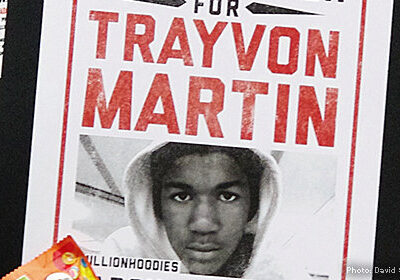
Release the Vote: Felon Disenfranchisement in Florida
In 2011, we saw a triple play of voter suppression with redistricting, HB 1355 (dubbed the Voter Suppression Act), and regressive changes to Florida’s Clemency Rules. The Florida legislature is accountable for the first two and to their credit, they did try to fix some of the mess that they created. But, Florida is not off the hook yet with disenfranchisement.
It saddens me to say that Florida ranks high on the list of states that disenfranchise individuals indefinitely after they have returned to the community. And as a result, our state’s denial of voting rights for people with past felony convictions is about to go under the international human rights microscope.
By Joyce Hamilton Henry

Constitution Day: What Precisely Are We Celebrating?
On Tuesday, September 17th, we celebrate the 226th birthday of our Constitution. But what precisely should we celebrate?
The founders of this country created a remarkable document. It is the legal and political framework for our democracy. But it was a deeply flawed document.
Because strict legal limits on the power of government are needed in a majoritarian democracy, principles protecting individual liberty were codified in a Bill of Rights, which was not part of the Constitution as it was drafted on September 17, 1787, nor was it part of the Constitution submitted to the 13 states for ratification.
So when we celebrate the Constitution, we celebrate not only those who created the Constitution during the summer of 1787, but also those who had a broader vision of liberty and fought to improve it.
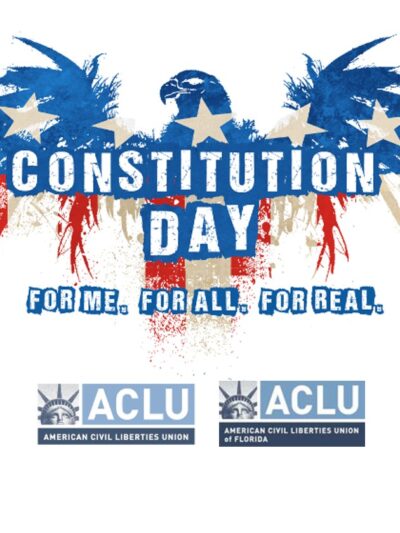
The March on Washington: Dream of a Better America
ACLU of Florida’s Field Coordinator Nikki Fisher is attending the 50th Anniversary March on Washington. She will be blogging her experiences for ACLUFL.org
This past weekend, I traveled to Washington DC to commemorate the 50th Anniversary on the March on Washington. Friends and colleagues have been asking me how I would describe the trip. The best explanation: I have been on cloud nine since Saturday. The energy, inspiration, and enthusiasm of the crowd were indescribable. The diversity of messages, of people, of generations, and sex, race, religion and everything else all involved in thefight for justice in the United States was inspiring. Seeing the continued struggle of all Americans coming together on Washington is something I will never forget.
By Nikki Fisher

Stay Informed
Sign up to be the first to hear about how to take action.
By completing this form, I agree to receive occasional emails per the terms of the ACLU’s privacy statement.
By completing this form, I agree to receive occasional emails per the terms of the ACLU’s privacy statement.
